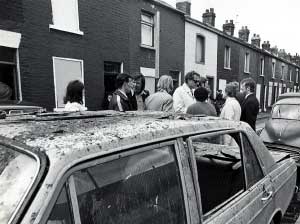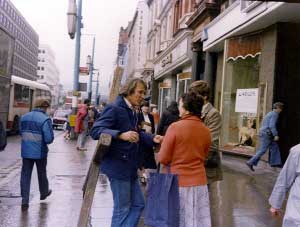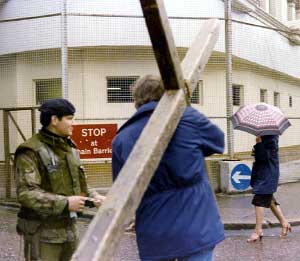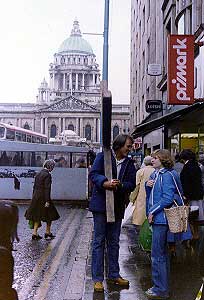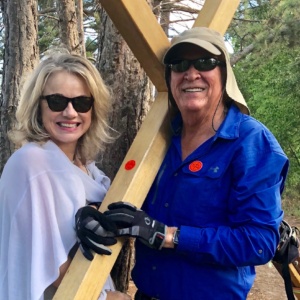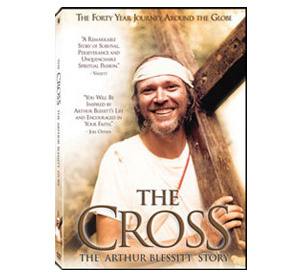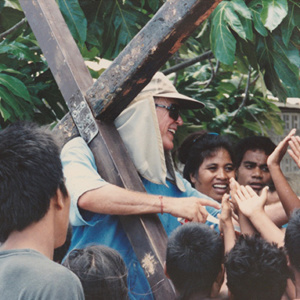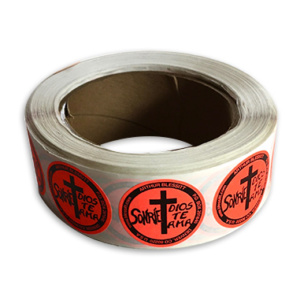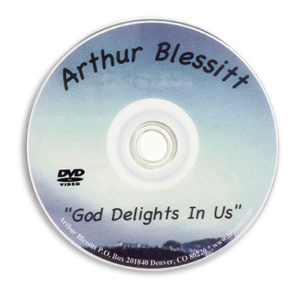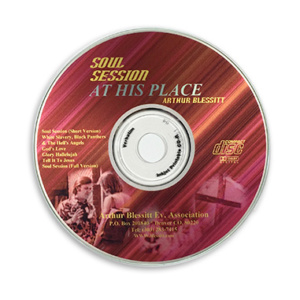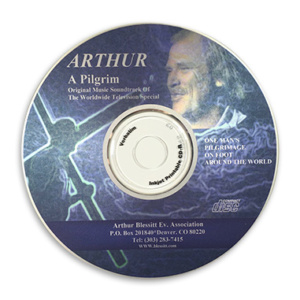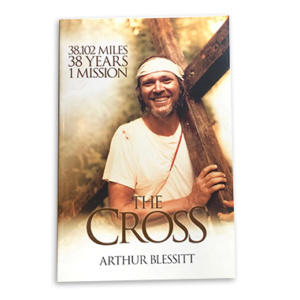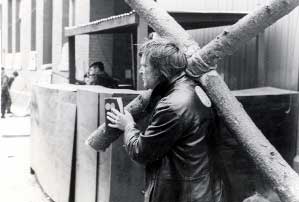
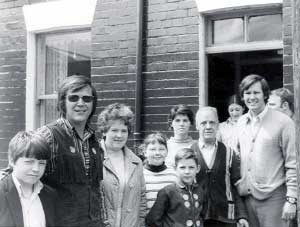
1971-1972 and 1979
The thought of Belfast, Northern Ireland conjures up thoughts in our minds of hate, strife and war. The eyes of the world observe this seemingly unending horror where Catholics and Protestants are in bloody conflict. Most people in Northern Ireland have memories going back to hundreds of years of injustices to past generations. The Catholics generally want a united Ireland and the Protestants generally want to remain a part of the United Kingdom (Great Britain). Everyone sees himself as a patriot in defense of his homeland.
I carried the cross in Northern Ireland five different times on five different trips. The first was in May 1971, then in October-November 1971, March 1972, May-June 1972 and October 1979. The following are excerpts from these trips .
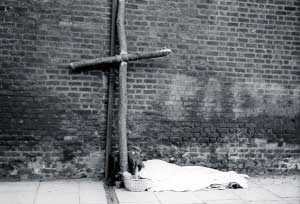 May 1971
May 1971
My friend from America, Fenton Morehead, was with me as we carried the cross through the Catholic side of the battlefield. We saw two armored cars coming along the street. As the cars stopped, soldiers leaped out, deploying along the sidewalk, ready for action. Several grabbed us. One ordered, “Lay down that cross, you are going with us.”
The young men in their camouflaged uniforms, trembling and clutching their rifles halfway pushed us into the armored car. Children from a nearby school began screaming and throwing rocks. Fenton and I were in a British armored car on the way to military headquarters.
One man who radioed ahead said, “We have those two priests.”
So they know who we are. It was decision time now.
What was going to happen? The officer who met our armored car escorted us into the military building. There was a discussion for a few minutes, he then turned to us and said, “Reverend Blessitt, there has been a mistake, you are free to go.
“I beg your pardon,” I said.
The officer repeated his words. The man who had brought us spoke up. “Sir, but we followed orders.”
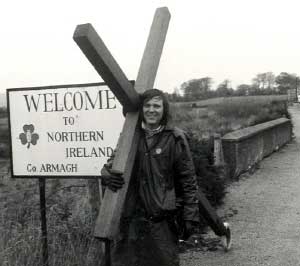 The officer in charge stopped him and they spoke again for a few moments. A group of soldiers gathered around looking at us. They seemed very surprised. Finally, the first officer who had spoken repeated that we were free to go.
The officer in charge stopped him and they spoke again for a few moments. A group of soldiers gathered around looking at us. They seemed very surprised. Finally, the first officer who had spoken repeated that we were free to go.
“But, why were we arrested?” I asked.
“We are now all aware of who you are.”
“But, I don’t know the way back to my cross.”
He turned and gave an order and the same two armored cars that had brought us here, drove us back. The troops talked to us and we shared with them about Jesus. Before we got out we had a prayer and passed Jesus stickers around, which they stuck on their gun butts.
As we leaped out of the vehicle children immediately surrounded us. They had gathered around the cross to protect the cross. We had been taken away, but we had now returned. We were heroes to the children and preached Christ to them.
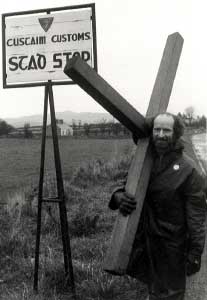 As Fenton and I walked along the street with the cross, a man stepped up and, in a clear, firm voice said, “We have been watching you. Don’t cross that intersection or you’ll die. You’ll never come back alive.” He was trembling in anger.
As Fenton and I walked along the street with the cross, a man stepped up and, in a clear, firm voice said, “We have been watching you. Don’t cross that intersection or you’ll die. You’ll never come back alive.” He was trembling in anger.
“Jesus loves you,” I said, offering him a Bible.
“You’ve been warned. Just don’t cross over.”
He turned and walked away quickly. Fenton and I looked at each other. We had agreed to make a large circle around the troubled area, and there was no turning back. We had agreed to take care of each other’s family if either one of us died. We knelt and prayed together. We had undertaken a mission and it lay before us. We had to go on.
Another time a man stepped up to Fenton and me and said, “Don’t go back into the troubled area or you’ll need this.” He handed us three nails each. Fenton threw his away almost immediately, but I kept mine as a souvenir.
We set up the cross in the middle of the peace line. Fenton and I were going to fast and pray for 24 hours. On one side of us was the Protestant area, and on the other was the Catholic side. In between were the British troops in pillboxes. There was barbed wire and barricades. At a quarter to midnight we heard sounds of singing, then saw three elderly ladies and an old, tall man zigzagging through the barbed wire and barricades. They were coming toward us. They were from a group called ‘Christians in Action’ and were singing the wonderful song written by Audrey Meyer, “His Name is Wonderful”. The words echoed through the night. Fenton and I, on that war torn night, threw off the blankets we were wrapped in and with no introduction, joined that little group. We formed a circle lifting our hands toward heaven, and joined in singing, “He is the mighty King, Master of everything, His name is wonderful, Jesus my Lord.”
We were all crying. Our voices were off-key, but the beauty was beyond words. It seemed as though the angels were singing with us.
A small group of people gathered on the Protestant side and on the Catholic side, and a few of the British troops stepped out of their pillboxes, jeopardizing them selves to sniper fire. The war didn’t end, but at least for a moment there was peace! I could see the cross and a Catholic church in the distance, a cross on a Protestant church, and our cross in the middle. Three crosses in the midst of war. Something is wrong! In the midst of churches and crosses, we’ve lost the real Jesus in this land.
Block after block of buildings were blown up, riddled with bullet holes. Often you could hear bursts of gunfire.
“Are you a Protestant or a Catholic?” someone asked me.
“Oh, I’m for Jesus,” I replied.
“Which side is He on?” they’d ask.
October 27, 1971 — It’s my 31st birthday and the second day of a three-day fast in the middle of Belfast, praying for peace, love and forgiveness. I sat under the cross talking to the people that came by. All night I lay in blankets as the fighting went on around me.
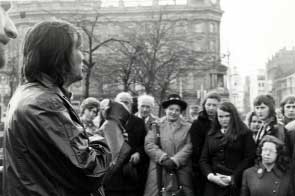 Just before midnight two armored cars stopped and several young soldiers leaped out, their faces blackened, clutching rifles and machine guns. They all faced different in directions. Then, one of them ran up with his arms full of hamburgers and hot tea. I talked to them a few at a time as the others stood guard. They were risking their lives to bring us food. I prayed no sniper’s bullets would shatter their kindness. They waited for me to eat. I was on my second day of the fast, having only had water to drink. How could I violate that? “What would you do, Jesus?”
Just before midnight two armored cars stopped and several young soldiers leaped out, their faces blackened, clutching rifles and machine guns. They all faced different in directions. Then, one of them ran up with his arms full of hamburgers and hot tea. I talked to them a few at a time as the others stood guard. They were risking their lives to bring us food. I prayed no sniper’s bullets would shatter their kindness. They waited for me to eat. I was on my second day of the fast, having only had water to drink. How could I violate that? “What would you do, Jesus?”
“I’d eat it,” I felt Him reply. I ate and then I had prayer with the soldiers at the back door of their armored car. This was my birthday in the battlefield, which was typical of my life. But there was no place I’d rather be than in the will of God and, after all, who ever gets a birthday dinner with people risking their lives tobring it to you. Oh, I pray for peace.
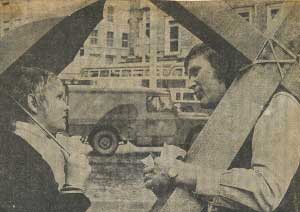 1972
1972
I carried the cross in Northern Ireland for 40 days. Carried the cross and preached in every town with over a thousand people in it. It was a glorious and powerful time.
One morning as I was carrying the cross through Belfast’s city center a car stopped me just before I got to a bridge in the downtown area. The young man behind the wheel leaned toward me and asked me to speak to his mother-in-law about Jesus. She sat in the front seat next to him. I shared with them the good news of Jesus Christ and then told her I ‘d like to pray for her to receive Jesus.
She shook her head no, “I don’t need that. I don’t believe in that.”
Just then a tremendous car bomb exploded. The shattering concussion threw me headfirst into the car, halfway into the woman’s lap. She threw her arms around me. “Pray, pray! I want Jesus. I believe.” So, with me in her lap, we prayed and she gave her heart to Jesus. The Lord had saved her and had protected me. If I had continued walking I would have been among those who were blown up.
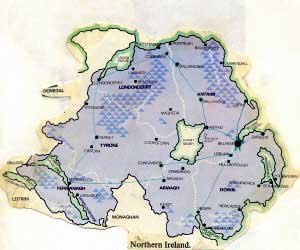 I crossed the bridge and the scene was horrible. Parts of bodies were lying all over the street. One person was killed and many critically injured. Rescue workers arrived on the scene at the same time I did. The first moment I just stood there, letting all the horror of these crying people sink into my mind. People were running about looking for members of their families. They were bleeding and staggering. There I was, with the cross, face to face with exploding bombs, blood and war. Tears poured down my cheeks. I leaned the cross against a building and went into the tragic scene seeking to minister first aid and the hope of Christ in a troubled country.
I crossed the bridge and the scene was horrible. Parts of bodies were lying all over the street. One person was killed and many critically injured. Rescue workers arrived on the scene at the same time I did. The first moment I just stood there, letting all the horror of these crying people sink into my mind. People were running about looking for members of their families. They were bleeding and staggering. There I was, with the cross, face to face with exploding bombs, blood and war. Tears poured down my cheeks. I leaned the cross against a building and went into the tragic scene seeking to minister first aid and the hope of Christ in a troubled country.
I was invited to meet with the IRA in a “no-go area” in Belfast. I was led to the hid den meeting place. We walked through dark buildings, then into a big room that was like a bar. Men and women were drinking and listening to live music. Once inside I was taken into another room where I stayed, sharing Christ with several of the top IRA leaders. Finally, the leaders asked me to speak to the entire group. I stood in the smoke-filled room with about 150 IRA gunmen and car bombers. I preached to them about Jesus, pleaded for love, forgiveness and repentance. When I finished, they applauded and wanted me to come over to their individual tables. As I left they said. “Don’t fear preacher. You are safe in Ireland. Everyone loves you, even the Protestants.”
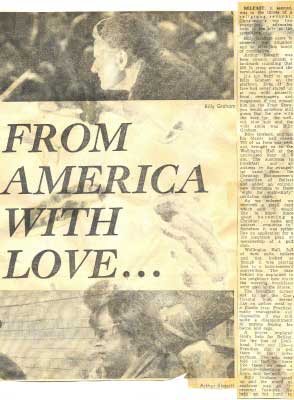 I first met Billy Graham in the spring of 1971 in Vero Beach, Florida. He invited me to spend a day with him talking and praying. My friend from Miami, Fred Roach, had flown me in his plane to meet Billy and his wife, Ruth. This was the beginning
I first met Billy Graham in the spring of 1971 in Vero Beach, Florida. He invited me to spend a day with him talking and praying. My friend from Miami, Fred Roach, had flown me in his plane to meet Billy and his wife, Ruth. This was the beginning
of a relationship based on love and respect.
Billy Graham wanted to come to Northern Ireland in May of 1972.
He called for me to take him on the streets of the city in a battle
area so he could meet the people. I agreed, on the condition that
the news media not be alerted until after we had completed our
walk. We had fellowship and prayer on Saturday, May 27.
What a team! Only his private photographer came along with us.
What a day with the crusade evangelist, Billy Graham, with the
street evangelist, Arthur Blessitt.
He was given a supply of little red Jesus stickers that you could
peel off and stick on. He pulled off the one I stuck on him to see
what it read. He softly read the words, “God Loves You”, and smiled,
then stuck it back on himself rather low, just about stomach level.
“Oh, no! No!” I said. “Don’t put it there.”
“Why not?”
“Because if you get shot at by a sniper, they’ll use that red dot as a target. If you get hit, it’ll take you all day to die, but if you put it here,” I said, pointing to his heart, “you’ll go just like that,” and snapped my fingers.
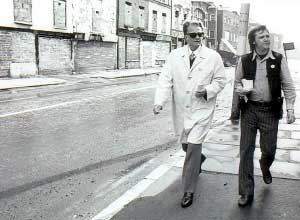 He grabbed the sticker and stuck it over his heart. It stayed there all day. Soon, Billy Graham was feeling at home, putting Jesus stickers and gospel tracks in the pillboxes of the British troops, speaking to them about Christ and walking along the streets.
He grabbed the sticker and stuck it over his heart. It stayed there all day. Soon, Billy Graham was feeling at home, putting Jesus stickers and gospel tracks in the pillboxes of the British troops, speaking to them about Christ and walking along the streets.
Around 10:00 a.m. I heard a shout, “Hey, preacher! Come over here and preach to us. It’s Sunday morning and we’re all inside.”
I looked over and saw an old bombed out building. Inside was an illegal bar with about 45 people drinking and smoking, their tables covered with empty beer bottles. “I want you to meet Billy Graham,” I said. Most of them knew who Billy Graham was, and they all stood up and shook his hand. I turned to Billy and said, “I know this is not a regular type crusade for you to preach, but I’d like to give you the opportunity to preach to these men.”
He laughed and replied, “Oh, no, no, Arthur. You go ahead. This is more your style. I want to hear you preach …I’ll pray.”
Just as I was about to begin, an old drunk yelled out, “Preacher. I want to sing a song before you preach. It’s a gospel song.” “Okay,” I answered.
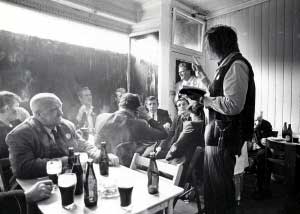 He began to beat rhythmically on the table, and then in his drunken voice began to sing “Devil Woman,” not quite a George Beverly Shea song. It wasn’t really a gospel song, but an old country song that was from the man’s heart. It started off this offbeat Sunday morning in style.
He began to beat rhythmically on the table, and then in his drunken voice began to sing “Devil Woman,” not quite a George Beverly Shea song. It wasn’t really a gospel song, but an old country song that was from the man’s heart. It started off this offbeat Sunday morning in style.
After the singing, I read from John 3:16: “For God so loved the world that He gave His only begotten Son that whosoever believeth in Him should not perish, but have everlasting life.”
When I finished preaching, everyone in the bar applauded. Afterwards I said a prayer and invited everyone who wanted to receive Jesus to pray along with me. It was an indescribable situation. It was certainly memorable, Billy Graham in an illegal bar on Sunday morning in the heart of war-torn Belfast.
“Billy,” I said with a smile as we left, “maybe you could get George Beverly Shea to sing that song, ‘Devil
Woman’, in one of your crusades.” We laughed as we started along the streets again.
Billy and I knelt to pray in the middle of the barbed wire and barricades at the Peace Line. Troops and pillboxes… our hearts were broken with the war, yet here were God’s servants in the midst of the conflict, seeking to change hearts and hold forth hope, love and good news.
From the Protestant side we met a man on the street, and as Billy started to share with him about receiving Jesus, the man said to us, “Well, if I ever met Billy Graham I think I’d get saved. He’s the only one that gets to me. I’d like to meet him.”
I spoke up. “Sir today is your day of salvation. I want you to meet Billy Graham.”
Billy took off his hat and sunglasses. The man fell under deep conviction. It was so glorious to see Billy kneel with a man and see the man converted to Christ. It was a wonderful moment.
I was carrying the cross in Belfast during the long war. A teacher and her class saw one of her young boys wearing a Jesus sticker. She thought it would give a good witness to her class, so she asked, “What is that?”
“Oh, it’s a wee badge.”
“Well, where did you get it?”
“The man stuck it on me.”
“What was the man doing?” she pressed.
“Dragging half of a barricade down the road.”
The war did not end because of my five trips through the troubled land, but we were obedient to the call of God. I preached all over Northern Ireland in every major town and city.
It was a wonderful place where one day I do believe love will prevail and peace will be a reality where the sounds of the street will be of children playing and lovers walking hand-in-hand. Not the sound of bombs and hands clutched in strife. The words of the angels at the birth of Christ still produce hope. “Glory to God in the highest and on earth, peace and good will toward men.”
In 1979, I again returned to Northern Ireland to preach several rallies and carry the cross.
How wonderful to be with the beautiful people again.
Pilgrim followers of Jesus
Arthur and Denise Blessitt
Luke 18:1
